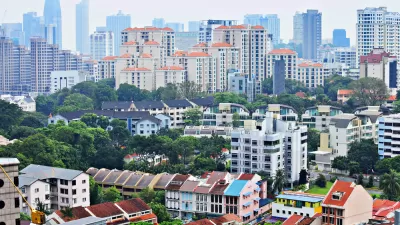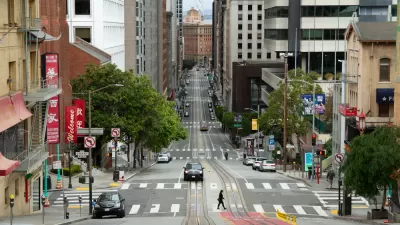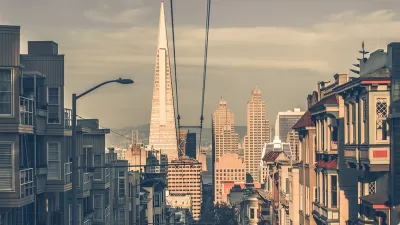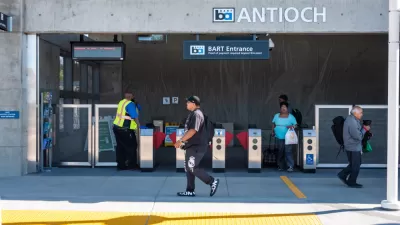For urbanists who have reduced their carbon footprints by driving less and living more densely in smaller homes, researchers from UC Berkeley have some bad news. Your reduced emissions are canceled out by those in the suburbs ringing your city.

"People in the densely populated cores of big cities are responsible for less greenhouse gas emissions, but the more carbon-intensive lifestyle of their far-flung suburbs cancels out any of the benefits, researchers at UC Berkeley found," writes Tony Barboza.
“The affluent suburbanites that commute long distances more than make up for the low-transportation footprint of urban dwellers,” said Daniel Kammen, a professor of energy at UC Berkeley [and co-author of the study "funded by the National Science Foundation and the California Air Resources Board; published in the journal Environmental Science & Technology."]
That is not to discount the lesser impact of city-dwellers who can have "a 50% smaller carbon footprint than a similar-sized family in a distant suburb," writes Barboza.
Stephanie M. Lee of the San Francisco Chronicle also writes about the study, providing examples from San Francisco neighborhoods and its Bay Area suburbs.
Increasing population density in cities reduces emissions - but only to a point before the savings aren't that substantial and quality of life begins to suffer, said Kammen, who worked on the study with doctoral candidate Christopher Jones.
Check out your carbon footprint by zip code with these interactive maps.
FULL STORY: Carbon footprint maps reveal urban-suburban divide

Alabama: Trump Terminates Settlements for Black Communities Harmed By Raw Sewage
Trump deemed the landmark civil rights agreement “illegal DEI and environmental justice policy.”

Study: Maui’s Plan to Convert Vacation Rentals to Long-Term Housing Could Cause Nearly $1 Billion Economic Loss
The plan would reduce visitor accommodation by 25% resulting in 1,900 jobs lost.

Planetizen Federal Action Tracker
A weekly monitor of how Trump’s orders and actions are impacting planners and planning in America.

Wind Energy on the Rise Despite Federal Policy Reversal
The Trump administration is revoking federal support for renewable energy, but demand for new projects continues unabated.

Passengers Flock to Caltrain After Electrification
The new electric trains are running faster and more reliably, leading to strong ridership growth on the Bay Area rail system.

Texas Churches Rally Behind ‘Yes in God’s Back Yard’ Legislation
Religious leaders want the state to reduce zoning regulations to streamline leasing church-owned land to housing developers.
Urban Design for Planners 1: Software Tools
This six-course series explores essential urban design concepts using open source software and equips planners with the tools they need to participate fully in the urban design process.
Planning for Universal Design
Learn the tools for implementing Universal Design in planning regulations.
Caltrans
Smith Gee Studio
Institute for Housing and Urban Development Studies (IHS)
City of Grandview
Harvard GSD Executive Education
Toledo-Lucas County Plan Commissions
Salt Lake City
NYU Wagner Graduate School of Public Service





























